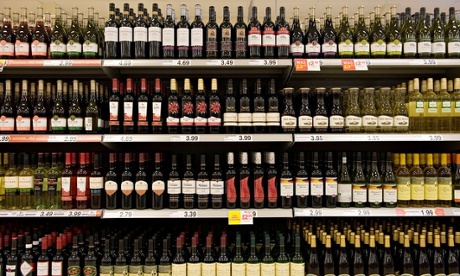
Both the Daily Mail and the Independent reported over the weekend that a bottle of wine a day might not be bad for you. The articles quote a retired Finnish professor, Kari Poikolainen.
Among his reported claims are that moderate drinking is less harmful than being teetotal, and that it’s only after drinking 13 units per day that alcohol is harmful. The Mail claims that UK guidelines are therefore too stringent, as the government currently recommends a maximum of one large glass of wine for women (2-3 units), and slightly more for men (3-4 units), per day.
According to the article, Professor Poikolainen has looked at "decades of evidence" to draw these conclusions. Sadly none of this evidence is mentioned in the article*, and his comments fly in the face of current alcohol guidance from governments and the vast majority of public health scientists.
There has already been criticism of current guidelines for alcohol consumption in the UK. The Royal College of Physicians has written to the government suggesting that guidelines should reflect recent evidence suggesting that frequency of drinking is important in disease risk, rather than simply quantity per day. The recommended daily limits seem to be based on rather old evidence, and a more nuanced guide to alcohol consumption might be more informative to consumers wanting to monitor their drinking.
Given there are already confusing messages presented to the public about what is a safe amount of alcohol to drink, claims about moderate alcohol use without any evidence to back them up are incredibly unhelpful and potentially dangerous; muddying already cloudy waters.
There is no doubt that alcohol is harmful, and current evidence (paywall) suggests this is the case even in small amounts, and certainly less than 13 units per day.
Poikolainen has mentioned, in published research, that drinking is related to mortality in what is known as a J-shaped curve; those who drink a small amount are at lower risk of death and illness than those who drink nothing, but the risk rapidly rises in those who drink a lot. However, this is quite a simplistic finding, and to paraphrase Ben Goldacre, it’s a bit more complicated than that.
Firstly, in the UK at least it’s vanishingly rare to be a non-drinker, so comparisons between drinkers and non-drinkers are hard to do. Not only this, but while there are some who have chosen not to drink for lifestyle reasons, it’s also common for non-drinkers to be recovering alcoholics, or those who are already ill and have been advised to give up alcohol by their doctor. There may be other reasons why those who don’t drink are at higher risk of early death than those who drink a little, other than some health-restorative property of alcohol.
Studies that are assessing the relationship between alcohol use and health outcomes need to take all potential differences between those who drink and those who don’t into account. People can’t be randomly assigned to either drink or not, which is what would happen in an experimental design to compare (for example) the effectiveness of a new medicine. This J-shaped curve could simply be a result of these differences not being properly measured and accounted for.
There is also a myth that red wine, in moderation, might be protective against cancer. Sadly, this is due to wild extrapolation from studies which have shown that one substance found in red wine might prevent a type of DNA damage linked to breast cancer in cultured cells. Cancer Research UK has a great blogpost about why this doesn’t mean red wine is protective against cancer. CRUK is clear in its guidance: alcohol can cause cancer, and the less you drink, the lower your risk.
I hope that Poikolainen will present the "decades of evidence" referred to, so we can all make our own minds up about the amount of alcohol that we choose to drink, but headlines claiming a bottle of wine a day is fine, without any support, do nothing to help either the health of the nation, or faith in the quality of science reporting.
Given how common alcohol use is, and how harmful it is as a substance, it's vitally important that the public is presented with evidence about harms as clearly as possible. This should be part of a wider requirement for better advice and guidance on alcohol use to be updated to better reflect the evidence available.
* I have been trying to find out where the quotes in the article have come from – if anyone has seen a press release or similar, I would love to hear from you. Get in touch, I’m @soozaphone on Twitter, or leave a comment.

